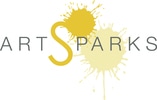Programme Offerings
|
Creative Learning Lab
Housed within under-resourced schools, the Creative Learning Labs offer a space to nurture children’s creative potential, and foster essential 21st century learning and life skills. Carefully designed visual art and design-based interventions contribute to this vibrant space for hands-on, experiential, inquiry-based learning. Creative Learning Labs serve children 1st through 8th grades. Model School Initiative Awareness building and advocacy regarding the vital role that visual art & design can and should play in children’s education are important aspects of ArtSparks’ work. Through the Model School Initiative ArtSparks works closely with both students and teachers at a core group of schools. Model schools receiving our carefully designed school-based programmes, geared towards 6th-9th grade, offer exemplars that we periodically disseminate through various platforms such as public exhibitions, educational conferences, publications, and other forums. Partnership Programme Strategic partnerships with other community-based organizations that work with children and/or teachers enable ArtSparks to leverage resources and mobilize others while expanding the scope of its work towards helping support children’s growth and development. |
Testimonials
|
The confidence of the students to express their thoughts seems to have really been enhanced by the programme. The programme has created a space for engaging meaningfully and giving shape to ideas and beliefs. The integration and application of a range of skills in everything the students do, the conviction with which students state a point of view, validating them with reasons, are all discernible since their participation.
—Principal Skills like collaboration are so important. And now, through their work in the Creative Learning Lab, I am seeing students are learning to collaborate more. When asked: what does collaboration mean, the students now say: being happy when working together; taking everyones ideas and putting them together; learning to compromise. —Teacher I was struck and moved by the powerful messages and expressive power of the student’s artworks. Art seems to be a most effective way to encourage critical thought and problem solving. —ArtSparks Exhibition Attendee |
What are 21st Century Learning Skills?
|
“21st century learning skills are increasingly being recognized as the skills that separate students who are prepared for increasingly complex life and work environments in the 21st century, and those who are not” (P21's Framework for 21st Century Learning)
Below are the key 21st century learning skills:
Why Teach 21st Century Learning Skills? In 2010, IBM carried out a survey of more than 1,500 Chief Executive Officers from 60 countries and 33 industries worldwide, and found that—more than dedication, integrity and fairness—the quality most desired by employers today is creativity. Needless to say, the nature of today’s information age jobs is very different from the jobs of the industrial era. Routine job skills of the past find no place in the 21st century workplace. Organizations today need a workforce that is equipped with skills beyond the fundamentals of reading, writing and arithmetic. To be successful in the workplace of the information age, one needs to be able to think critically about issues, solve problems creatively, communicate effectively and work in collaboration. In an age where change is the only constant, understanding and applying 21st century learning skills allows us to be adaptive and innovative in responding to new demands and changing circumstances. What Are Life Skills? "Life skills are defined as psychosocial abilities for adaptive and positive behaviour that enable individuals to deal effectively with the demands and challenges of everyday life” (UNICEF, 2003). Below are some of the key life skills:
Why Teach Life Skills? Life skills form the core of our social and emotional well being, and the extent to which we are able to apply them can determines how we adjust and respond to life’s myriad experiences. When fostered over a period of time, these skills become internalised and manifest as habits. |
Why the Visual Arts?
|
Research indicates that meaningful experiences with visual art contribute to the development of valuable thinking skills and attitudes whose benefits extend well beyond the art room. The ability to:
Need more proof? A 2009 report by the Wallace Foundation and Harvard University states that the arts help develop the full potential of individuals, communities, and societies, and education without the arts is an impoverished education. According to the report, “The arts have a powerful cognitive dimension and are an important way of understanding the world, different from, but just as valuable as, the sciences.” |
Content and images are the property of ArtSparks Foundation. Copyright © 2024. All Rights Reserved.
